Written by Masterofoneinchpunch, a man from Modesto, California, whose interests include the NBA, MMA, movies, and setting fires. You can find him on Twitter @masterofoneinc1, where he discusses shoes, wisdom, movies, more shoes, and non sequiturs.
☆☆☆☆
Hong Kong cinema comprises some of the most unique movie experiences one will encounter. Commercial cinema is the norm and the hybrid entertainments that are made for mass consumption can range from the ridiculous to the sublime. While Hong Kong’s most popular genres from wuxia, martial arts, and triad movies are familiar to transnational audiences, there is much more to this prestigious movie-making culture.
Defining what a Hong Kong film is can be a bit tricky. I will expect that the director be a legal resident of Hong Kong and/or employed by a legally registered film company in Hong Kong (now HKSAR). Hong Kong Film Award’s rules of eligibility for 2008 has slightly influenced some of my decisions, though I am actually going to be stricter with my own personal criteria.
For example, here are some important collaborative films I am not counting for this list, though please watch if you have not seen: Hero (2002, China/Hong Kong, Zhang Yimou), Raise the Red Lantern (1991, China/Hong Kong, Zhang Yimou), Crouching Tiger, Hidden Dragon (2000, Taiwan/Hong Kong, Ang Lee), Farewell my Concubine (1993, China/Hong Kong, Chen Kaige), Enter the Dragon (1973, Hong Kong/USA, Robert Clouse), and Master of the Flying Guillotine (1976, Hong Kong/Taiwan, Jimmy Wang Yu).
As with all canons, there is certainly a bias on my part. I enjoy much from the action cinemas of Jackie Chan, Sammo Hung, John Woo, and Chang Cheh. I have come to appreciate much of the directorial work of Johnnie To and acting of Chow Yun-fat. I like much of the art-house direction of Wong Kar-wai. I have started getting into such directors as Michael Hui and Ann Hui. David Borwell wrote his excellent book Planet Hong Kong (available in an online second edition, in which I am mentioned in the end section) in 2000 after watching about 380 films, though he has watched many more in the years since. I have seen a few hundred more than that, so I feel qualified to make this list.
Someone was nice enough to put this list on IMDB. You can view that here.
FYI: Critical or popular films I have not seen: The House of 72 Tenants (1973), Boat People (1982), Comrades: Almost a Love Story (1996).
So away we go:
If I have written a full review for a movie, I will link it in the title.
☆☆☆☆

1. Police Story (1985, Jackie Chan)
One of the greatest action pictures I have ever seen. Its influence can be seen in many American action pictures, from Tango and Cash (1989) to Bad Boys II (2003), but none can quite compare to the ruggedness and the actual danger the stuntmen faced in this film (several were injured quite badly). From the destruction of the shanty town by a runaway car to bad guys thrown off of buses onto the concrete to Jackie risking his life in several fight scenes, I have never been as amazed with a film as this movie. This movie is one of the main films that got me into Hong Kong cinema.
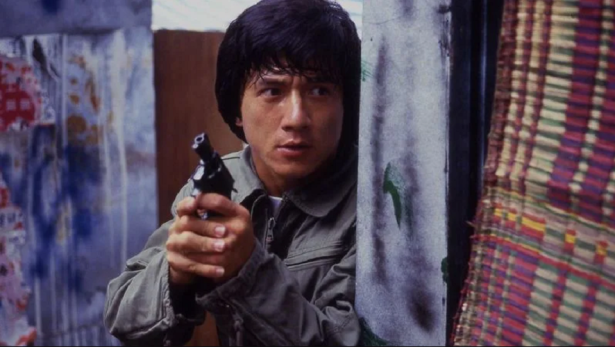

2. Hard-Boiled (1992, John Woo)
The other film that got me into Hong Kong cinema. While for me it is a toss-up between this and The Killer (which is probably a better made film), I end up choosing Hard-Boiled for its voracious appetite of gun battles, as well as for the fact that I have seen this many more times than The Killer. While some of this movie can be read as an allegory of the handover of 1997 and the Chang Cheh influence is quite evident, who’s going to think about that during the final, very long, shoot-em-up action scene. Chow Yun-fat spitting out the toothpick is one of my favorite scenes.


3. Drunken Master (1978, Yuen Wo-ping)
Most Hong Kong film fans and critics usually put the sequel ahead of this movie – I do not. While I like both, this film has always had a special place in my martial arts viewing acumen as one of the quintessential old-school martial arts films. After years of toiling in somewhat obscurity in HK cinema, Jackie Chan had two hits in a row for Seasonal. After this film exploded in popularity, Chan’s career would never be the same. An irreverent take on Cantonese hero Wong Fei-hung, Drunken Master is a great mixture of comedy and excellent “form” action. Like The Big Boss (1971) and A Better Tomorrow (1986), Drunken Master is a watershed moment in Hong Kong cinema.


4. The Killer (1989, John Woo)
The literal translation of the Chinese title is “A Pair of Blood Spattering Heroes,” which gives you an idea of what you are in for. This film would influence many Hollywood filmmakers with its heroic bloodshed tale of an assassin (Chow Yun-fat in another great performance) who accidentally blinds an innocent woman, his cop doppelganger in Inspector Li Ying (Danny Lee) who is pursuing him, and the assassin’s journey to make-up for the loss-of-sight. This mixture of Chang Cheh male code and Jean Pierre Melville brooding character influences is absolutely brilliant, unique, and, surprisingly, probably had more influence with American and European audiences than with Hong Kong ones.
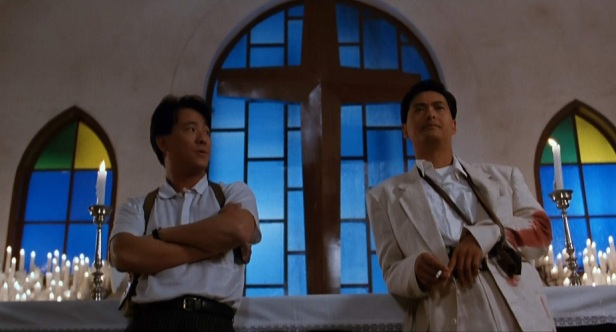

5. Chungking Express (1994, Wong Kar-wai)
Quickly shot while on break from Ashes of Time, this beautifully directed movie of loneliness and lamenting – timely because of the upcoming handover to China – combines the aesthetics of Wong Kar-wai’s Eastern heart with Western influences such as Godard and Bresson. I find the movie utterly charming, with Faye Wong as the most memorable character with her crush on cop 663 (Tony Leung) and her ineffable choices in dealing with his apartment. This movie may change your interest in expiration dates.

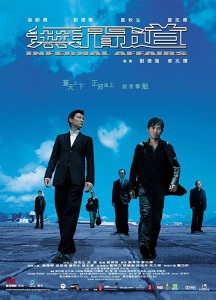
6. Infernal Affairs (2002; Andrew Lau Wai-keung, Alan Mak Siu-fai)
This movie is mostly known for being the source of the Academy Award winning The Departed (2006; I prefer this of the two, though I do like The Departed), which is unjust, considering how strong the performances are and how interesting the story is. Infernal Affairs is one of my favorite triad/cop dramas to come out of Hong Kong. This movie would spawn two sequels and, analogous to The Godfather, the second is a great movie that some consider better then the first while the third is just not quite as good as the previous two.
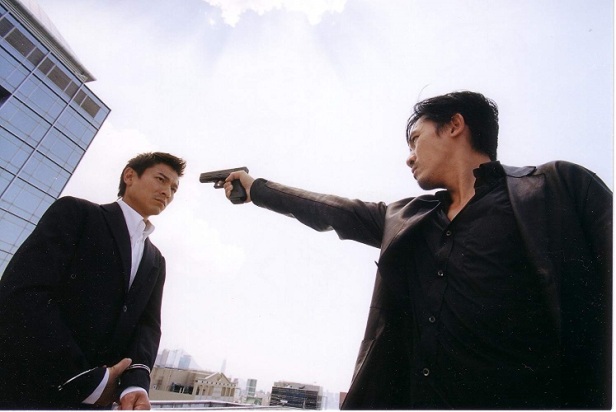
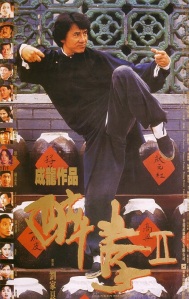
7. Drunken Master 2 (1994; Liu Chia-liang, Jackie Chan)
One of the few martial art (no wuxia) films to get positive critical reception. It is in Time Magazine’s “All-Time 100 Best Films” list for example. While I am one of the few to like the first better then the second, this is still one of my favorite martial arts movies with its irreverent portrayal of Wong Fei-hung. The 10 minute plus fight with Ken Lo at the end is awesome in its pace, construction, and technique. There is great comedy with the late Anita Mui as Chan’s step-mother (though I am not so sure of using Ti Lung as his dad).


8. Days of Being Wild (1990, Wong Kar-wai)
Often considered in Hong Kong as Wong’s greatest film, it is close to being my favorite as well. Leslie Cheung gives a fantastic performance (my second favorite, Farewell My Concubine being his greatest role) as York, a rich womanizer who is searching for his real mother (both literally and figuratively). His “one minute” scene with Maggie Cheung has to be one of the all-time great pick-up lines. This is Christopher Doyle’s first film with Wong, and the brilliant cinematography certainly shows. It is a movie not only about “Ah Fei” culture, but also about longing, loneliness, and the memory of time.


9. A Better Tomorrow (1986, John Woo)
The influence of this film cannot be denied. It would create an icon in Chow Yun-fat as Mark, the quintessential heroic bloodshed hero, create a fashion trend in sunglasses and raincoats (in a very warm environment), and forever stereotype Woo with operatic gunplay. The Jean Pierre Melville and Chang Cheh influences are thick, and being a fan of both certainly helped me appreciate this film (I have seen it several times, both before watching analogous Melville and Cheh films and after as well). A Better Tomorrow‘s themes of loyalty and brotherhood and stylized violence would not only change Hong Kong cinema, and ultimately American action cinema, it is also one of my favorite films.


10. The 36th Chamber of Shaolin (1978, Liu Chia-liang)
The archetypal Shaolin and training movie. Awesome in its depiction of how a pushover can became a master through arduous training and a determined heart. This film would stereotype Lau Kar-fei as San Te and for years he would have to keep his head shaved (if hair was necessary, he would wear a wig) to be ready for the next Shaolin monk role. Originally released in the United States as Master Killer (not really a good title for a monk), it would be one of the most popular Shaw Brothers films released in the US and in Europe. This is a great movie to show to someone new to martial art cinema.

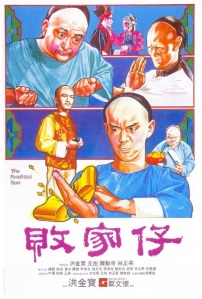
11. The Prodigal Son (1981, Sammo Hung)
Sammo Hung is arguably one of the most important figures in all of Hong Kong martial arts. He is not only important as an actor and martial arts choreographer but as a director as well. This is his ode to an important figure in Wing Chun – Leung Jan (along with Warriors Two). It is not only a superb example of the display of Wing Chun but also has some excellent scenes dealing with Peking Opera, has excellent cinematography, and has a good blend of martial arts and comedy. This movie has one of Lam Ching-ying’s best performances as Leung Yee-tai, the male performing as a female in the opera troupe.

12. Come Drink With Me (1966, King Hu)
King Hu did not direct many films, but he is always held in high esteem, and such critics as David Bordwell and Stephen Teo consider him amongst the finest of Hong Kong’s directors (even though a good chunk of his small oeuvre is from Taiwan). This Peking Opera influenced movie is a sight to behold, with sagacious choreography (Han Ying-chieh) and cinematography (Ho Lan-shan). Come Drink With Me features one of the most famous of martial art heroines in Chang Pei Pei’s Golden Swallow.

13. The Mission (1999, Johnnie To)
Trying to pick a favorite Johnnie To film is a futile exercise. I like so much of his output. But The Mission is one of those great low-key crime films. It must have come as a big shock in Hong Kong. Its showing of Triad-life malaise is like a warped version of a Michelangelo Antonioni film. The Mission boasts a great cast with Anthony Wong, Francis Ng, Simon Yam, Roy Cheung, and To regular Lam Suet. It fits perfectly in To’s “team spirit” theme. The Missions is a great film to watch if the only Triad films you are familiar with are from John Woo.

14. Once Upon a Time in China (1991, Tsui Hark)
Another Wong Fei-hung film on my list, this time helmed by intermittently brilliant Tsui Hark and starring one of the most well known of China’s martial artists, a wushu-trained (this is Northern style, compared to the Hung Gar style the real Wong Fei-hung was known for), excellent athlete named Jet Li. Once Upon a Time in China‘s dazzling fight with ladders is one of the best ever committed to celluloid. This movie has an interesting plot dealing with the turmoil of early 20th Century China, great direction, and movie sets and choreography that look quite good. Followed by countless sequels, this is still my favorite of the bunch.

15. Encounter of the Spooky Kind (1980, Sammo Hung)
I feel that this is the greatest comedic martial arts Hong Kong with horror film there is. Sammo Hung, who directs and stars in this, is in his prime. He is in the best shape of his life as well as in his creative peak. The dueling Taoist finale is the best scene in the film. Fans of exploding chickens and hopping vampires (kyonsi) will definitely appreciate this. Be warned, the filmmakers were as nice to chickens in this as Sam Peckinpah was in Pat Garrett and Billy the Kid (1973). I definitely recommend Encounter of the Spooky Kind to those who are interested in seeing many different aspects of Chinese supernatural concepts.

16. Throw Down (2004, Johnnie To)
Oh, this is such a fun film! Made as an homage to Akira Kurosawa’s Sanshiro Sugata (1943) and Kurosawa in general, it still feels like a To film. It is quirky and quite eccentric, but fans of Johnnie To’s more personal films like PTU and The Mission will find this one of his better movies. One of the best performances of Louis Koo Tin-Lok (Election, Rob-B-Hood), as Szeto To, who is an enigmatic ex-Judo expert who mysteriously quit competition to drink, gamble, and stumble his way through life. There are excellent secondary characters (like an angry, mumbling, video game playing triad member) and quirky situations that seem to inhabit Johnnie To’s universe.

17. Project A (1983, Jackie Chan)
When you combine the talents of Seven Little Fortunes’ Sammo Hung, Jackie Chan, and Yuen Biao, you know something special is going to happen. Add in the dangerous disregard for stuntmen’s lives, the famous clock stunt that Jackie did as homage to Harold Lloyd, the bicycle chase scene reminiscent of Buster Keaton, the Cantonese comedy, the painful fight scenes, and even pirates, and you have another great Jackie Chan film from the 1980s. This film helped push martial art films out of the Qing era. While some prefer the sequel to this, after watching both several times this is by far my favorite of the two. This is a great looking and fantastic action film.

18. The Private Eyes (1976, Michael Hui)
A top Hong Kong films list is not complete without a film by Michael Hui. This is a director and actor I really need to see more of though and have been waiting forever for HKFlix to get a box set of his work in to purchase. I found The Private Eyes to be an absolutely hilarious mixture of sight gags (one of the better shoplifting gags I’ve seen), nonsense humor, martial arts references (Sammo Hung was the action director so the Bruce Lee humor references worked quite well), midgets, giants, and pretty much everything thrown in. Fans of comedies like Airplane, the Pink Panther series, and The Naked Gun series should check this out. Hong Kong aficionados should make this a top priority, if they have not already seen it.

19. Infernal Affairs II (2003; Andrew Lau Wai-keung, Alan Mak Siu-fai)
Very rarely do sequels even come close to measuring up to the original (and the third in this series does not measure up to the first two), but Infernal Affairs II is a prequel that is well-acted, well-paced, and by some fans considered better than the original. While I am not sure of that, I am sure that this is a worthy film in many respects. Francis Ng’s performance (who has had experience with the triads in the past) parallels Michael Corleone in a cool intensity in his triad leader Ngai Wing Hau. I think it is one of the best performances I have seen in fact. The duo of Eric Tsang and Anthony Wong also work well against each other. This is a great film to show people who think Hong Kong movies are too excessive in acting styles.

20. Kung Fu Hustle (2004, Stephen Chow)
Stephen Chow is a world unto himself. Take his hybrid humor of Cantonese language puns, slapstick situations, Warner Bros. cartoon influence, and sometimes off-putting violence, then mix it with a fanatical devotion to Bruce Lee, add a plethora of other elements, and you get Stephen Chow. Kung Fu Hustle is a brilliant mixture of comedy, special effects, and martial arts. Chow is in very familiar territory as the underdog and slacker Sing who eventually has to get over his inadequacies and face the number 1 assassin (of course in Chow’s world this is a very middle-aged looking man who is very, very deadly in his prowess of martial arts). Chow is the chosen-one indeed.

21. The One-Armed Swordsman (1967, Chang Cheh)
While not my favorite one-armed martial artist film (that would be Master of the Flying Guillotine), The One-Armed Swordsman is certainly exciting, bloody, and another watershed movie on this list from Chang Cheh. This movie stars Jimmy Wang Yu, a swimming champion and future Taiwanese gangster (who would figure prominently in the lives of several big Hong Kong stars), whose martial art skills were never the best nor was he the greatest actor. However, whenever he had just one arm, his films were usually better (not sure why). This is a violent, revenge epic full of missing limbs that is one of Cheh’s better movies.

22. Exiled (2006, Johnnie To)
A great heroic bloodshed tragedy with a mix of film noir and western elements. Johnnie To displays, over and over, unique ways to show triad/cop films with his own style of “team spirit.” Francis Ng when motivated, like Anthony Wong in this, is full of panache and is one of the better Hong Kong actors. Exiled is a different take then The Mission, with many of the same themes but probably an easier film to get into than The Mission for fans of action cinema. Superb choreography, another good soundtrack in a To film, this time from Guy Zerafa, and, well, this movie is just plain worth watching.

23. Knockabout (1979, Sammo Hung)
Sammo Hung always had a knack for finding and using talent. This movie features a few underrated Hong Kong actors and martial artists. Most notably Leung Kar-yan (known affectionately as “Beardy” to many fans), Lau Kar-wing (always under his much more famous brother’s shadow, unfortunately), and Yuen Biao, who never really rose in popularity as much as his opera brothers Sammo Hung and Jackie Chan, though his athletic talent is better, and he has a charm that is not always talked about. This would be Yuen’s first starring role and is an excellent example of an old-school kung fu film full of sifus (kung fu masters), excellent martial arts, comedy, and even a professional wrestling move that inspired The Rock.

24. Happy Together (1997, Wong Kar-wai)
This is probably the most difficult to watch of Wong’s films because of the amount of bickering, anger, depression, and longing felt at the end of the relationship between Lai Yiu-Fai (Tony Leung Chiu-wai) and Ho Po-wing (Leslie Cheung). The pain can be felt as these two, who are destined not to be together, stay together much longer than they should. This film is a cathartic experience with two excellent performances as the leads. If you are a sad and depressed individual, than this is the film for you to watch so you can state, “At least I’m not stuck in a foreign country with no money and a withheld passport.” Unless, of course, you are stuck in a foreign country with no money and no passport, then watch the next movie instead.

25. Shaolin Soccer (2001, Stephen Chow)
Stephen Chow is one of the most unique filmmakers in Hong Kong, where he works at a snails pace compared to the ludicrous speed of most other directors. His works are silly but well-made comedies. Here, he takes a concept of soccer and throws in his normal mixture of down-and-out character, redemption, Bruce Lee references, and mo lei tau (nonsense humor) and outputs a hilarious film about a Shaolin Temple graduate who is trying to spread his doctrine and gets a Shaolin soccer team together, and dharmic football is the result, but not without some much needed training and obligatory setbacks before that can happen. Now what’s with Vicky Zhao’s makeup?

26. Iron Monkey (1993, Yuen Wo-ping)
Wong Fei-hung rears himself again (though played by a girl in this film) as a very young kid, with his dad Wong Kei-ying (Donnie Yen) and a Chinese Robin Hood type named Dr. Yang (Yu Rong-guang). While some of the under-cranking is overdone, there are still many impressive fight scenes, including a brilliant one choreographed on wooden poles where a conflagration of fire is burning beneath. Some purists dismiss the wire-laden fight scenes, but I find aesthetic pleasure in the way these were done (though I never forgive under-cranking). This film also has the deadly Buddha’s palm, which is another great reason to watch the movie.

27. Sparrow (2008, Johnnie To)
I love this French-influenced Johnnie To film, which is a mixture of Jean-Pierre Melville, Francis Truffaut, Umbrellas of Cherbourg, and Bresson’s Pickpocket. Sparrow is quite a bit different from most of To’s films (though it does have some resemblance to Yesterday Once More (2004)), but it still contains many of his auteur themes such as team work and redemption. The climax duel of the pickpockets is one of the best-directed scenes I have seen in quite a long time, and the team’s bicycle ride is quite unique as well. Sparrow has beautiful use of location, as well, and was partially made to be a time capsule to show the splendor of older Hong Kong.

28. The Magic Blade (1976, Chor Yuen)
One of my favorite wuxia films from the Shaw Brothers with the consummate chivalrous hero Fu Hung-hsueh (Ti Lung). Chor Yuen is an underrated director (though his later films can sometimes suffer from trying to add in too many plots twists); he was very prolific and had a great eye for visuals. His films, such as this one, put more emphasis on character and situations, but the fights still look good, helped by action director Tong Gai. Look out for the “dead” tavern as one of the more unique and haunting visuals. A fun movie and well worth watching, with many facets, from ingenious weaponry to spotting the influence from chambara and western movies.

29. Fist of Fury (1972, Lo Wei)
Fist of Fury is probably higher than it should be, because of the stereotyping of Japanese and Lo Wei’s direction (though you wonder, how much did Bruce Lee direct?), but every fan of martial arts and Hong Kong cinema should have seen this, because of the magnetism of its most famous martial artist, Bruce Lee, and its importance in Hong Kong cinema. For those who do not know, Jackie Chan does stunts in this film, including playing the Japanese boss getting kicked very hard (he was actually yanked by a wire to make him fly far). The American release was titled The Chinese Connection. This is not Fists of Fury though, which was originally released in Hong Kong as The Big Boss.

30. Warriors Two (1978, Sammo Hung)
Hung was in top form in the late 1970s and early 1980s, not only as a performer but also as a director. Warriors Two is his first film in the unofficial Leung Jan (played by Leung Kar-yan in this film) Wing Chun series, and while I would put it a little below the second film, The Prodigal Son, not by much. Cassanova Wong’s physical presence and ability is awesome as Cashier Wah, who would later teach Yip Man, who would later teach Bruce Lee. There is a jump kick over a table here that has to be seen to be believed, and it certainly is Wong doing that jump. For me, this is the ultimate cinematic treatise on Wing Chun.

31. Mr. Canton and Lady Rose (1989, Jackie Chan)
For me, this is Jackie Chan’s most underrated film. It is not full of wall-to-wall action, and I think that is the main reason it is not as heralded as much as other films of his. Mr. Canton and Lady Rose is a beautiful-looking genre mix, inspired by Frank Capra’s Pocketful of Miracles (1961) (this being a remake of Capra’s own Lady for a Day (1933)), and it is full of vigor, comedy, beautiful sets, and costumes, since the film takes place in the 1930s, and the film contains a multitude of Hong Kong actor cameos. This movie has been released with a variety of titles including Black Dragon and Miracles. Stay away from the dubbed and/or shortened versions.

32. Fist of Legend (1994, Gordon Chan)
Another classic martial art film based on Chen Zhen, but this one is less racist, has a better plot, and is more restrained then the elder Fist of Fury (1972). It also has one of Jet Li’s best performances as the almost mythical Chen Zhen, and when Li is less reliant on wires, he can truly do some awesome fight scenes in front of the camera. Fist of Legend also has some of the best action scenes in 1990s Hong Kong cinema, including one that is inspired by a similar action scene in Kurosawa’s Red Beard (joint dislocating fun) and excellent battles with Yasuaki Kurata and Billy Chow thanks to the choreography from Yuen Wo-ping.

33. In The Mood for Love (2000, Wong Kar-wai)
While often fans of artistic cinema will be familiar with Wong Kar-wai and not as familiar with as much else from Hong Kong, and action fans will not be as familiar with the art-house cinema of Hong Kong, most of these two groups are familiar with Wong Kar-wai. I find In the Mood for Love to be his most divisive film amongst those two groups. However, I feel it is a brilliant, beautiful, and exquisite work on unrequited love. Tony Leung Chiu-wai and Maggie Cheung act superbly as two individuals who find that their respective spouses are having an affair with the other in 1960s Hong Kong. William Chang’s work as costume designer, production designer, and editor (and Wong’s most valued collaborator, with respects to Christopher Doyle) helps helm one of my favorite “romances” to come out of Hong Kong.

34. Running Out of Time (1999, Johnnie To)
I must admit I am a Johnnie To fan. I was not always though. I disliked some of the 1990s films, and I did not think much of him until I noticed he was getting more and more press several years back. After watching Running Out of Time and PTU, I was hooked on films To directed, co-directed, or even associated with (even going back to many of his 1980s films; those will not be on this list). This is a superb cat-and-mouse chase between a dying crook (Andy Lau) and Lau Ching-wan in the cop role. A mixture of Jean Pierre Melville and John Woo, Running Out of Time is a film I am really looking forward to revisiting, and it could even jump up a few notches on this list in the future.

35. A Better Tomorrow II (1987, John Woo)
The flat out best film that ever involved bringing back a dead character from a previous movie by introducing his twin brother. While the movie starts off with that hackneyed plot approach, it soon becomes much more. Though John Woo was not happy with the interference he got from producer Tsui Hark, he certainly left his stamp on this movie, with the heroic bloodshed theme and iconic slow motion. Chow Yun-fat gives a great performance as Ken Gor (the twin brother of the previous character) and for his troubles got injured on the set and lost part of his hearing (which you can see on the film) when Woo decided to explode things real good too close to Chow.

36. PTU (2003, Johnnie To)
Another Johnnie To film inspired by Kurosawa (in this case a bit from Stray Dog) and another To on my list. Some of you might find PTU a bit too slowly paced, but I was fascinated by the characters and situations of this story’s perpetual night in Hong Kong. Simon Yam’s acting performances put him on the top of my favorite Hong Kong actors. To’s personal projects have often been my favorite films from him. This movie took three years to make with everyone involved doing it as a side project. The cinematography from Cheng Siu-keung is excellent, and the score reminds me a bit of Dead Man.

37. The Way of the Dragon (1972, Bruce Lee)
Released in the US as Return of the Dragon, this would be Bruce Lee’s sole completed directorial effort and his most personal film. While this is not as accomplished as Charles Laughton’s Night of the Hunter in the one-and-only director output, The Way of the Dragon is a fine release for Bruce Lee. It might not have aged as well as I would have liked, but it is one film I have seen too many times not to put in this top list. The most known fight scene from this is between Chuck Norris and Bruce in a coliseum in which they duel to the death. However, as I have learned from The Chuck Norris Facts, if they had really fought, it would have been the end of the universe as we know it.

38. Dirty Ho (1979, Liu Chia-liang)
One of the greatest English titles in all of the Shaw Brothers films. The directly translated title “Rotten Head Ho” is not much better. Dirty Ho was the first martial arts film I remember seeing growing up, and for years I could not find it. It is not officially out in an R1 (there is a good R3), and stay away from the many boots (the only copy I currently have is a boot), but it is such a fun martial arts film directed by the stalwart Liu Chia-liang and starring his “brother” Gordon Liu (basically blood brother, not adopted as some sources state, and he was not an orphan) in this kung fu comedy. You will have to forgive the all-too-common abrupt ending though.

39. Shanghai Express (1986, Sammo Hung)
Aka The Millionaire’s Express. This is a Hong Kong version of It’s A Mad Mad Mad Mad World (1963) where almost all the popular actors of Hong Kong are either starring or have cameos in this wild and crazy film from Sammo Hung, though Jackie Chan is missing. I think fans of Hong Kong cinema will find it more of interest than novices, but it still is a good combination of action, (broad, very broad) comedy, stunts, cowboys, ninjas, prostitutes (I don’t remember any ninja prostitutes though, or are there?), and much, much more. Check out the awesome jump stunt by Yuen Biao risking his life for our entertainment.

40. Fong Sai Yuk (1993, Corey Yuen)
Aka The Legend. Jet Li stars as Fong Sai-yuk, another Cantonese folk hero whom Li plays with his normal aplomb but with an added dash of panache he has not always had a chance to perform. In fact, this is one of Li’s favorite roles, and we can see why when he gets to show off his humoristic side. However, Li is almost overshadowed by an excellent performance from long-time Hong Kong actor Josephine Siao Fong-Fong, who plays his protective mother who eventually gets caught in the age old cinematic tradition of a woman pretending to be a man, having another woman fall for that woman, and causing higgledy-piggledy.

41. Election (2005, Johnnie To)
Johnnie To’s very candid look at pre-Hong Kong-handover triad life on the verge of an election for a triad boss, symbolic of both the triad’s change of power and Hong Kong’s. This movie contains another great performance from Simon Yam as the calm and calculated family man Lam Lok, who is up for election in the Wo Sing Society, running against the brash, somewhat psychotic Big D (Tony Leung Ka-fai). But be careful of what you say when you go fishing with Lam. Followed by a worthy sequel you will enjoy if you like this one.

42. Heroes of the East (1978, Liu Chia-liang)
Aka Shaolin Challenges Ninja. Here you have a rare combination of romantic comedy, positive Japanese-Chinese relationships (rare enough itself; though, of course, the Chinese always win in this movie), and martial arts. Such a brilliant and excellent fusion of not only genres but also martial art styles (Japanese versus Chinese) that you find Heroes of the East on many martial art aficionados’ top lists. Gordon Liu as the main hero in this film is excellent as always, except for his wig (he kept his head shaved at that point in career since he was doing many Shaolin films), as Ah To who is having problems with his Japanese wife Kung Zi (Mizuno Yuko) who considers herself and her culture better at martial arts.

43. July Rhapsody (2002, Ann Hui)
The first Ann Hui film I saw. I certainly need to improve my knowledge of Cantonese social dramas, and Hui is often considered one of the most important. While this film starts slowly dealing with a laborious and languid aspect of relationship malaise, it eventually becomes an emotionally fascinating tale of interpersonal problems. July Rhapsody is a mix of Bresson-influenced acting style (there is one scene at the end of the film which is analogous to the end of Pickpocket) with a camera style that is less austere and more Wong Kar-wai. It would be Anita Mui’s last performance before her death from cervical cancer.

44. SPL (2005, Wilson Yip)
Aka Kill Zone. It is a toss up on whether I prefer this film over Yip’s other important collaboration with Donnie Yen (they have done more films together though) Flash Point. While Flash Point has one of the greatest endings I have seen in MA, SPL has the better story. This is an important film in MA choreography, because Yen had started to incorporate MMA elements into his fight plan with spectacular results. This makes for a kinesthetically pleasing, and quite unique, viewing experience. The use of multidimensional characters helps in getting the viewer interested in the story, but it is the action, with such highlights as Wu Jing fighting Donnie Yen in one of the best weapon scenes in quite a long time, that makes one adore this film.

45. Project A II (1987, Jackie Chan)
A quite engaging sequel to one of the most important films in Hong Kong history. While this film is not quite as well-made as the original, it has all the important elements of comedy, martial art action, death-defying stunts, and chase scenes that made Project A II one of the most excellent releases from the golden age of Hong Kong cinema. As usual with the higher budgets that Chan had during this era, the movie looks quite good, with much money spent on sets, costumes, and set-ups for stunts. You can also look at the hidden allegory about the upcoming handover to China, but do not overthink it. This was an absolute smash hit in Hong Kong, and I feel that this is another must-watch for fans of Hong Kong action films.

46. The Delightful Forest (1972; Pao Hsueh-li, Chang Cheh)
Another film like The Magic Blade that I had not heard much on, and I currently cannot find much on the history of it. When The Delightful Forest finally came out on R1, I was not expecting much, but I got a beautifully brutal ode to chambara from Chang Cheh and Pao Hsueh-li. The ending is so over-the-top, you think it must have been influenced by Sword of Doom (1966). Ti Lung reprises his role as Wu Sung which he previously played in The Water Margin (1972) about a powerful kung fu artist who killed a tiger with a single punch. Lung is one of Hong Kong’s better actors from this time, and he has a bad-ass panache that tends to be quite believable. This movie has quite a good chance of being higher on this list after further viewings.

47. The Longest Nite (1998, Patrick Yau)
While Patrick Yau is credited as director, guess who did most of the direction? Yes, Johnnie To. This was a pattern for awhile with To, where he would assign a director to a project and then take over, not being satisfied with the original director’s work. The Longest Nite is one of the best examples of Hong Kong film noir, with a nihilistic and bleak outlook that I do not recommend to feel-good filmgoers. The penultimate ending, which is influenced by Lady From Shanghai (1947) as well as Enter the Dragon (1973), was later redone in To’s Mad Detective (2007; Lau Ching-wan also stars in this movie), but I feel it is more effective here.

48. Full Contact (1992, Ringo Lam)
Speaking of dark and nihilistic work, Full Contact is one of those films where you can easily see its faults, but it still commands a good amount of interest and repeated viewings for myself, and I actually prefer Full Contact over Lam’s City on Fire (1987). It is enjoyable to see Chow Yun-fat’s somewhat morally ambivalent character (I believe at the time it was his least good guy role; his emperor character in Curse of the Golden Flower (2006) is a more evil man). An unbelievably flamboyant performance from Simon Yam, and that is saying quite a bit. This film is well-known for its bullet cam shot (not the first, as often misattributed) used to magnificent effect.
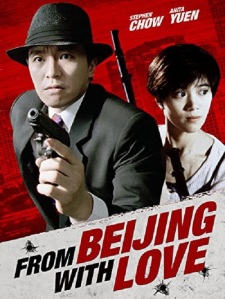
49. From Beijing With Love (1994; Stephen Chow, Lee Lik-chi)
Stephen Chow’s first co-directorial work is completely uneven and sometimes even brutal, but it is quite a funny spy spoof film. There is also an undercurrent theme that is harsh on Mainland police, which is quite brave of Chow at that particular time. The movie’s mo lei tau (nonsense) comedy is best when Chow uses such gags as a solar flashlight invention and a gun that shoots in reverse one time and straight the next. Now, why is he talking to the toilet, and what does porn have to do with gunshot wounds? To answer these questions, you will have to watch this movie.

50. Mr. Vampire (1985, Ricky Lau Koon-wai)
Not only is this the film that would typecast Lam Ching-ying as a mono-brow Taoist priest (fat-si) master of sticky rice and remover of evil things, it is a film that would spawn more sequels than any other film in the kyonsi (jiangshi, aka hopping vampire) horror subgenre – though none of them really compare to the first one. This movie is one of the high points in the horror/comedy/action genre from Hong Kong, alongside Spooky Encounters. Easily recommended to those who are new to Hong Kong horror, that is unless they have a fondness for chickens or snakes. Ricky Hui, who recently passed away, is superb in his supporting role as a bumbling assistant.
☆☆☆☆
This article was originally published on The Criterion Forums by Masterofoneinchpunch on May 10, 2010. The Criterion Forums is now defunct. Here, the article has been updated by Masterofoneinchpunch, edited and formatted by Ethan Collins.

I have been a fan of Asian cinema for a long while now, including Hong Kong movies, and this is one heck of an awesome list. I haven’t seen all of the films, but quite a number of them, and there are some real gems here! Great post! 😊
LikeLiked by 1 person
It was a privilege to have this article on my site!
LikeLiked by 1 person
Masterofoneinchpunch is a legend.
LikeLiked by 1 person
Indeed, he is!
LikeLike